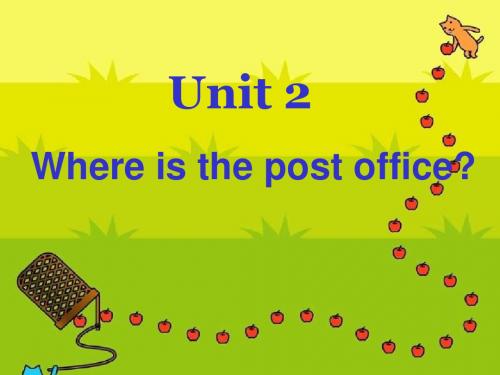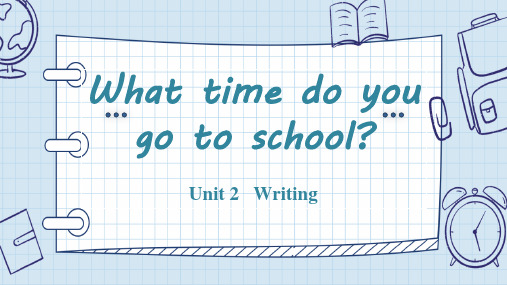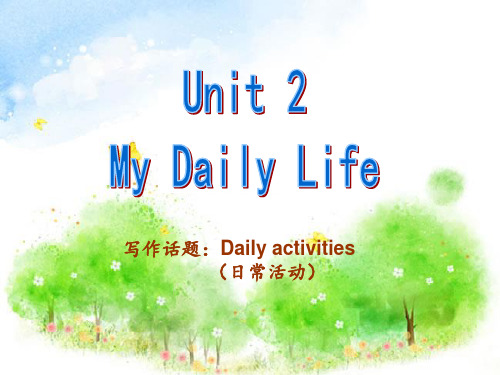人教版英语七年级下册unit2单元全单元课件
合集下载
七年级英语Go_for_it!_Unit_2_说课稿课件人教版新目标

三、教学目标
1、语言知识 词汇: A、重点掌握表示建筑物种类的名词, 如post office, hotel, bank, supermarket, street, pay phone, avenue, B、掌握如下描绘性形容词及方位副词,如 clean, quiet, dirty, busy, right, left, down, along, C、方位介词,如next to, across from, in front of, near, between, behind D、短语,如 turn right, turn left, go down, go straight on, walk along, go along,
2、教材的地位及其作用 、 本单元的教学主要内容是:学习“问路指路”的 常用表达方式 ,该话题与学生的日常生活紧密 联系在一起,容易唤起学生的学习兴趣,这对 于提高学生的综合能力很有帮助,特别是说的 能力。通过本单元的学习描述某一建筑物的位 置,学会问路,指路,学会利用地图描述某一 社区。 本单元继续使用一般现在时,这是一个生活中离 不开的时态,也是最基本的一个时态。新课程 标准要求学生重点掌握一般现在时,这在英语 中使用频率很高,学好这一时态的用法对以后 其他时态的学习和交际有很大的帮助。
Students listen to teacher’s instruction and draw out the maps:
Map 1: Across from the bank is a supermarket. There is a post office between the library and the supermarket. Across from the supermarket is a park. Next to the park is a restaurant. Map 2: A library is next to the park. Across from the park is a bank. Next to the bank is a post office. Across from the post office is the restaurant, which is across from the supermarket.
七年级英语下 Unit 2 what time do you go to school全单元课件

Do you know how to ask the time?
• What time is it? • What is the time? • What time is it by your watch? • Can you read the time in English?
hour hand 时针
1a Match the activities with the picture.
1. get up
__c__
2. go to school __d__
3. get dressed __b__
4. brush teeth __f__
5. eat breakfast __e__
6. take a shower __a__
It has a big face. It has no eyes or ears. It has no legs, but it has three hands—two long hands and a short one. It has no mouth, but it can say “tick, tick, tick”.
时间的表示法:1.整点后用o’clock 2.点钟+分钟(用基数词表示)
4:00 four o’clock 11:15 eleven fifteen
12:00 twelve o’clock 3:50 three fifty
9:41 nine forty-one 2:20 two twenty
7:30 seven thirty 8:05 eight five
What time do you usually … in a school day?
eat breakfast
七年级英语下册_Unit_2_Where’s_the_post_office全单元课件 _人教新目标版

2. The park is _a_c_r_o_ss__fr_o_m___the bank. 3. The supermarket is __o_n___Fifth Avenue. 4. The pay phone is __n_e_x_t _to__ the post office. 5. The restaurant is in__fr_o_n_t_o_f the post office. 6. The hotel is __b_e_h_in_d____the library.
restaurant library park
My House
Gree n
Stree t
Supermarket
bridge
airport bank
Long
Street
Is there a sluibpreaarrmkyarket near here?
Yes, there is. / No, there isn’t.
Read and find Paul and Nancy in the picture.
Paul: Excuse me. Is there a hCooutnetryl: in the neighborhCoityo: dTo?ronto
Language:
Nancy: Yes, there is.Just go straight and turn left. It’s down Bridge Street on the right. It’s next to a supermarket.
-Where is the soccer ball? -It’s i_n__fr_o_n_t_o_f_ the box.
-Where is the soccer ball? -It’s a_c_r_o_s_s_f_r_o_m__ the box.
restaurant library park
My House
Gree n
Stree t
Supermarket
bridge
airport bank
Long
Street
Is there a sluibpreaarrmkyarket near here?
Yes, there is. / No, there isn’t.
Read and find Paul and Nancy in the picture.
Paul: Excuse me. Is there a hCooutnetryl: in the neighborhCoityo: dTo?ronto
Language:
Nancy: Yes, there is.Just go straight and turn left. It’s down Bridge Street on the right. It’s next to a supermarket.
-Where is the soccer ball? -It’s i_n__fr_o_n_t_o_f_ the box.
-Where is the soccer ball? -It’s a_c_r_o_s_s_f_r_o_m__ the box.
Unit2+Section+A2a-2d课件2023-2024学年人教版七年级英语下册

At 8 in the morning.
Get up, get up , I get up at six. Go to school, go to school, she goes to school at seven. Have lunch, have lunch, my family have lunch at twelve. Go home, go home, he goes home at four. Go to bed, go to bed, we go to bed at night.
Survey: the ime to get up
Name Time
Jim
5:00
Mary 5:30
Tom
6:00
…
…
Report: Jim gets up at five o’clock. Mary gets up at five thirty. Tom gets up at six o’clock … XX is the earliest.
( B )4. Tim works at a radio station. It’s ______ interesting job.
A. a
B. an
C. the
D. /
三.Fill in the blanks: 1. What time do you get up?
I get up at six o’clock.
night. 3. I take a bus _to__g_o_ (go) to school. 4. Cindy tells m__e_ (I) many things
about her school. 5. What time does your sister usually
Get up, get up , I get up at six. Go to school, go to school, she goes to school at seven. Have lunch, have lunch, my family have lunch at twelve. Go home, go home, he goes home at four. Go to bed, go to bed, we go to bed at night.
Survey: the ime to get up
Name Time
Jim
5:00
Mary 5:30
Tom
6:00
…
…
Report: Jim gets up at five o’clock. Mary gets up at five thirty. Tom gets up at six o’clock … XX is the earliest.
( B )4. Tim works at a radio station. It’s ______ interesting job.
A. a
B. an
C. the
D. /
三.Fill in the blanks: 1. What time do you get up?
I get up at six o’clock.
night. 3. I take a bus _to__g_o_ (go) to school. 4. Cindy tells m__e_ (I) many things
about her school. 5. What time does your sister usually
新目标人教版英语七年级下册单元主题写作课件(全册)

写作实践
假如你叫Tony,你希望加入你们学校的音乐俱乐 部。请根据提示,写一封电子邮件,表达你想要加入 该俱乐部的想法。
提示:1. 个人信息简介; 2. 在音乐方面的才能、特长; 3. 联系方式。
写作实践
要求:60词左右。开头及结尾已给出,不计入总 词数。
Dear Mr. Brown, I’m writing this email to you because
实战演练
Dear Rick, How are you? Now let me tell you about my day. __I___
_us_u_a_l_ly__g_e_t _u_p_a_t_6_:__0_0__i_n_t_h_e_m__o_rn_i_n_g_._T_h_e_n__a_t _6_:__1_5_I__ru_n_ _fo_r__h_a_lf__an__h_o_u_r_._I__b_ru_s_h__m_y__t_e_e_th__a_n_d__ta_k_e__a_s_h_o_w__e_r _a_t_a_ _qu_a_r_t_er__t_o_s_e_v_e_n_._T__h_en__I__h_a_v_e_b_r_e_a_k_fa_s_t__at__7_:__0_0__a_. _m_.__a_t _ho_m__e_._A_t_t_w_e_n_t_y_p_a_s_t_s_e_v_e_n_, _I _w_a_l_k_t_o_s_c_h_o_o_l._I__h_av_e__lu_n_c_h__a_t _te_n_t_o_t_w_e_l_v_e_a_t_s_c_h_o_o_l.__I__u_su_a_l_ly__g_o_h_o_m__e_a_t_5_:__3_0__p_. _m_.___
how I get to school. Now, let me tell you. ___________________________________________________ ___________________________________________________
Unit 2 Writing 写作课件 2022-2023学年人教版英语七年级下册

taste good, clean my room, have a good job, get dressed, brush your teeth, take a walk
4. He _h_a_s__a_g_o_o_d__jo_b__. He works at a radio station. 5. Here are your clothes. Go and __g_et__d_r_e_ss_e_d___ quickly! 6. I don’t have time to _c_le_a_n__m_y__r_o_o_m_ from Monday to
•Match the verbs in column A with the words in
column B.
A
B
taste
your teeth
clean
my room
have
a walk
get
good
take
dresห้องสมุดไป่ตู้ed
brush
a good job
•Use the phrases to complete the sentences.
get up, get dressed, brush (one's) teeth, have/eat breakfast/lunch/dinner, go to school, have classes, go home, go to bed
I always/usually/often/sometimes do sth. at .... I+ 频率副词+动词短语+at+时间.
话题分析
本单元以“谈论日常生活”为话题,要求同学们能描述自己 和他人的日常活动,倡导健康的生活习惯。
新目标(人教)七年级下册英语单元复习课件 Unit 2复习课件

【拓展延伸】 ①when意为“什么时候”,所表示的时间范围较广,既可询问
具体时刻,也可询问日期、月份、年份等。 ②when常用来提问年、月、日、上/下午等大概时间,此时
when不可与what time替换。
From twelve o'clock at night to six o'clock in the morning.从夜里十二点到早上六点。
on weekends
radio show
16.几点 ____w_h__a_t_t_i_m__e_______
1178..一半份小有时趣__的__工___作____a__n____i__n__t__e__r__e___s__ti_n_g__j_o_b__ 19.要么……要h么al…f …an;h或ou者r……或者…… ____________________ 20.做作业 _________________________
either...or...
do (one’s) homework
21.去睡觉 __g_o__t_o__b__e_d_________ 2223..到散家 步;__走g__e一_t__走h_o__m_____e_________________________ 24.快速地吃 _________ta__k_e__a__w_a__lk_ 25.做运动 ____________________
play computer games
go home
三、核心句型
1. 里克,你通常几点钟洗淋浴?
__W__h_a_t_ _t_im__e___ do you usually _t_a_k_e__ __a_ _s_h_o_w__e_r,Rick? 2. 我通常在六点半起床。 I _______ ____ _____ at six thirty. 3.u—su—a斯lly科g特et,u你p的广播节目在几点?——从夜里12点到早上6点。 —Scott,________ ________ is your radio show? —_______ wtwhealvte o'cltoimckeat night _______ six o'clock in the morning.
具体时刻,也可询问日期、月份、年份等。 ②when常用来提问年、月、日、上/下午等大概时间,此时
when不可与what time替换。
From twelve o'clock at night to six o'clock in the morning.从夜里十二点到早上六点。
on weekends
radio show
16.几点 ____w_h__a_t_t_i_m__e_______
1178..一半份小有时趣__的__工___作____a__n____i__n__t__e__r__e___s__ti_n_g__j_o_b__ 19.要么……要h么al…f …an;h或ou者r……或者…… ____________________ 20.做作业 _________________________
either...or...
do (one’s) homework
21.去睡觉 __g_o__t_o__b__e_d_________ 2223..到散家 步;__走g__e一_t__走h_o__m_____e_________________________ 24.快速地吃 _________ta__k_e__a__w_a__lk_ 25.做运动 ____________________
play computer games
go home
三、核心句型
1. 里克,你通常几点钟洗淋浴?
__W__h_a_t_ _t_im__e___ do you usually _t_a_k_e__ __a_ _s_h_o_w__e_r,Rick? 2. 我通常在六点半起床。 I _______ ____ _____ at six thirty. 3.u—su—a斯lly科g特et,u你p的广播节目在几点?——从夜里12点到早上6点。 —Scott,________ ________ is your radio show? —_______ wtwhealvte o'cltoimckeat night _______ six o'clock in the morning.
七年级英语下册写作教程:Unit-2-My-Daily-Life-(共41张)PPT课件

忙碌的生活,时间的表达使用
My daily life 恰当,句子安排合理。
I am busy every day. Every morning ,I get up at
6:30. At 6:50 , I eat breakfast . I have to go to school at
ten past seven. I often have lunch at twelve o’clock. 全文使用“after. after
7. In the end, it’s not the years in your life that
count. It’s the life in your years. 到头来,你活了多少岁不算什么,重要的是, 你是如何度过这些岁月的。
8. Turn the page on yesterday. Only ever think
What a … life …!
.
28
Step3 Write(写一写)
.
29
Step 4---Check(查一查)
篇章方面: 内容完整;要点齐全;布局合理
句子方面: 句子完整;主谓一致;动词时态;
连词使用
用词方面: 代词主格,宾格; 名词单复数;
动词搭配;副词位置
细节方面: 单词拼写;标点符号;大小写
拓展合理 (2分)
语言 词汇丰富 (1分)
(3分) 句法正确 ,语言优美( 2分)
卷面
书写工整( 1分)
(1分)
.
自我评价 同伴评价 教师评价
33
.
34
.35Biblioteka 本文脉络清晰,整篇 文章非常有条理性。
以时间为线索展开描述,随着 时间的迁移,写出了作者一天
人教版七年级英语下册unit2全单元分课时课件(153张)

go to school A: What time do you usually go to school? B: I usually go to school at…
A: What time do you usually…?
B: I usually ….at…
7:30
6:30
6:40
go to school
Activity
I
He
She
get up
brush teeth
eat breakfast源自go to schooltake a shower
Report : I get up at…I eat breakfast at … My friend xxx gets up at …. He eats breakfast
-7-
Do you know?
get up
get dressed go to school
brush teeth eat breakfast take a shower
Memory challenge!
看老师展示的图片, 快速说出短语。
1a Match the activities with the picture.
A. do; go to bed B. does; goes to bed
C. does; go to the bed D. does,;go to bed
5. — What's the time?
—__________ nine fifteen.
A. The time is B. It's C. At D. This is
at…. He goes to school at… xxx gets up at… She brushes teeth at…
Unit 2【复习课件】七年级英语下册单元复习(人教版)

Biblioteka 重点语法 询问时间与时间表达法
考点3;时间的表达法
分类
用法
例子
整点法
时间为整点时, 可用“整点数 It’s five o’clock./It’s five. +o’clock”表示, o’clock 可省略。 现在 5 点(整) 。
“先时后分”, 先读整点数, 再
顺读法
读分钟数, 都用基数词来读。 当分钟数小于10 时, 遇到数字
→ _s_o_m_e__b_r_u_s_h_es
一些刷子
11. tooth n. 牙齿→ ___t_e_e_th____(复数形式)
12. shower n.&v. 淋浴; n. 淋浴器(间)
13. fifty num. 五十→ ___f_iv_e_____五→ __f_if_t_e_e_n___十五
0, 发字母 o 的音/əʊ/。
6:30 为 six thirty 2:58 为 two fifty-eight 4:05 为 four o (/əʊ/) five
重点语法 询问时间与时间表达法
分类
用法
例子
a. 分钟数小于 30 时, 用“分钟数 +past+ 整点数”表示; b. 分钟数为 30 时, 用“half past+ 整 点数”表示; 逆读法 c. 分钟数超过 30 时, 用“60 减去分 钟数+to+ 下一个整点数”表示; d. 分钟数是 15 的倍数时, 可用 quarter表示。
地→__q__u_ic_k___ (形容词) 很快的 26. either conj. 或者 adv. 也→ ___to__o____ (同义词) 27. lot pron. 大量; 许多→___a_l_o_t_o_f___许多
考点3;时间的表达法
分类
用法
例子
整点法
时间为整点时, 可用“整点数 It’s five o’clock./It’s five. +o’clock”表示, o’clock 可省略。 现在 5 点(整) 。
“先时后分”, 先读整点数, 再
顺读法
读分钟数, 都用基数词来读。 当分钟数小于10 时, 遇到数字
→ _s_o_m_e__b_r_u_s_h_es
一些刷子
11. tooth n. 牙齿→ ___t_e_e_th____(复数形式)
12. shower n.&v. 淋浴; n. 淋浴器(间)
13. fifty num. 五十→ ___f_iv_e_____五→ __f_if_t_e_e_n___十五
0, 发字母 o 的音/əʊ/。
6:30 为 six thirty 2:58 为 two fifty-eight 4:05 为 four o (/əʊ/) five
重点语法 询问时间与时间表达法
分类
用法
例子
a. 分钟数小于 30 时, 用“分钟数 +past+ 整点数”表示; b. 分钟数为 30 时, 用“half past+ 整 点数”表示; 逆读法 c. 分钟数超过 30 时, 用“60 减去分 钟数+to+ 下一个整点数”表示; d. 分钟数是 15 的倍数时, 可用 quarter表示。
地→__q__u_ic_k___ (形容词) 很快的 26. either conj. 或者 adv. 也→ ___to__o____ (同义词) 27. lot pron. 大量; 许多→___a_l_o_t_o_f___许多
最新人教版初中七年级英语下册Unit 2 第二单元课件PPT

2021/5/30
brush teeth
A: What time do you usually brush teeth? B: I usually brush teeth at…
2021/5/30
have breakfast A: What time do you usually have breakfast? B: I usually have breakfast at…
after he gets up.
orty
• 6. Twenty and twenty is f_______.
2021/5/30
What time is it?
nine o’clock
2021/5/30
What time is it?
twelve o’clock
2021/5/30
What time is it?
2021/5/30
Inter view your friends. Ask and answer questions about their day.
2021/5/30
Unit 2
What time do you go to school?
Section A
Period 3 Grammar Focus &(3a ~ 3c)
Unit 2 What time do you go to school?
Section A Period 1 1a ~ 1c
2021/5/30
根据句意及首字母提示填词。
• 1. After I get up at 6:00, I brush myeet th . • 2. —When do your familysuually eat dinner?
brush teeth
A: What time do you usually brush teeth? B: I usually brush teeth at…
2021/5/30
have breakfast A: What time do you usually have breakfast? B: I usually have breakfast at…
after he gets up.
orty
• 6. Twenty and twenty is f_______.
2021/5/30
What time is it?
nine o’clock
2021/5/30
What time is it?
twelve o’clock
2021/5/30
What time is it?
2021/5/30
Inter view your friends. Ask and answer questions about their day.
2021/5/30
Unit 2
What time do you go to school?
Section A
Period 3 Grammar Focus &(3a ~ 3c)
Unit 2 What time do you go to school?
Section A Period 1 1a ~ 1c
2021/5/30
根据句意及首字母提示填词。
• 1. After I get up at 6:00, I brush myeet th . • 2. —When do your familysuually eat dinner?
人教版英语七年级下册 Unit 2 单元巩固与复习 课件(共30张PPT)

forty ['fɔ:(r)ti] num.四十 fifty ['fɪftɪ] num.五十 wow [waʊ] interj.(表示惊奇或敬佩)哇;呀 lot [lɒt], [lɑ:t] pron.大量;许多 funny ['fʌnɪ] adj.奇怪的;滑稽好笑的 run [rʌn] v. 跑;奔 Rick [rɪk] 里克(男名) Jim [dʒɪm] 吉姆(男名) Scott [skɒt], [skɑ:t] 斯科特(男名) Tony ['təʊnɪ] 托尼(男名)
4. 在晚上,我要么看电视,要么玩电脑游戏。 In the evening, I either watch TV or play computer games.
5. 在十二点,她午餐吃很多水果和蔬菜。 At twelve, she eats lots of fruit and vegetables for lunch. 6. 她知道它对她没好处,但是尝起来很好。 She knows it’s not good for her, but it tastes good. 7. 这是你的衣服。 Here are your clothes.
洗淋浴
take a shower
刷牙
brush teeth
吃早饭
eat breakfast
要么…要么…
either…or…
在上午/下午/晚上 in the morning/afternoon/evening
许多,大量
lots of=a lot of
在晚上
at night
洗淋浴
take a shower
2. 那是个有趣的早餐时间。 That’s a funny time for breakfast. 3. 学生们通常什么时候吃完饭? —When do students usually eat dinner? 他们通常在晚上6:45吃晚饭。 —They usually eat dinner at a quarter to seven in the evening.
Unit2SectionAGrammarFocus3c课件人教版七年级英语下册

Activities
Name1: ______
Name2: ______
Name3: _____
get up on weekends exercise
eat dinner
take a shower go to school
Words
Sentences
I我al总wa是y6s:h30a吃ve早b餐re。akfast at six thirty. always
Summary
• A:What time do you usually get up? thirty.
B: I usually get up at six
• A: What time does Rick eat breakfast? o’clock.
B: He eats breakfast at seven
人教新目标Go For It七年级英语下册
Unit2 what time do you go to school
SectionA Grammar Focus-3c
Proverbs:
Time is money. 一寸光阴,一寸金。 Time is life. 时间就是生命。 Time flies. 时光如梭 Time and tide wait for no man. 时不我待!
辨相析 同w点h:at 二tim者e 都和表wh示en“___什__么__时__候_______” 不同点:what time用来询问____具__体__的__时__间__点_____
when既可以用来询问____具__体__的__时__间__点_,还可用来询问__时__间__段_____。 具体用法: 1.对时间状语提问时,有时两者可以互换。
2020-2021学年人教七年级下册英语习题课件 Unit 2

英语
七年级下册 人教版
第二课时 Section A (2a2d)
一、根据句意及首字母或汉语提示完成下列句子。每空一词。 1.It's not easy for her to find a good __j_o_b_______(工作). 2.My grandpa watches TV for an hour at ___n_ig_h_t_____(晚上). 3.Ms. Green __n_e_v_e_r____(从不) eats hamburgers.She thinks they're not healthy. 4.I know twenty and thirty is __fi_f_ty_____. 5.My sister gets up ___e_a_r_l_y____on school days.She doesn't want to be late for school.
13.David often goes to the school library at_four_thirty.(对画线部 分提问) ___W__h_e_n__d_o_e_s_____David often go to the school library? 14.When do you have art on Friday?(改为同义句) ___W__h_a_t__ti_m_e______do you have art on Fr )6.We do Chinese kung fu ________ four ________ the afternoon.
A.at;in
B.in;in
C.at;on
D.in;on
( A )7.Look at the clock.It's ________ now. A.nine thirty B.ten fifteen C.nine fortyfive D.six fortyfive
- 1、下载文档前请自行甄别文档内容的完整性,平台不提供额外的编辑、内容补充、找答案等附加服务。
- 2、"仅部分预览"的文档,不可在线预览部分如存在完整性等问题,可反馈申请退款(可完整预览的文档不适用该条件!)。
- 3、如文档侵犯您的权益,请联系客服反馈,我们会尽快为您处理(人工客服工作时间:9:00-18:30)。
3) much表示数量时,只能修饰不可数名 词。如:
We don’t have much milk. 我没有很多牛奶了。
4. She knows it’s not good for her, but it tastes good!
1) be good for …表示“对……有益; 对……有好处”; be bad for…表示“对……有害; 对……有坏处”。
• 三、根据汉语提示完成句子。 • 1. 我没有时间吃早餐,因此我通常吃得很
快。
• I don’t have _____ ____ for breakfast,
so I usually __m_u_c_h__tim__e____.
• 2. 他在晚上或者看电视或者玩电脑游
• 戏。 eat very quickly
Apples taste good. 苹果尝起来味道很好。 Does the ice-cream taste nice? 冰淇淋的味道尝起来很好吗?
拓展:taste作名词,意为“味道”。 The ice-cream has a taste of lemon. 冰淇淋有点柠檬的味道。
一、写出下列词组 1. 步行 t_a_k_e__a_w_a_l_k_ 2. 做作业 d_o__h_o_m__e_w_o_r_k__ 3. 打扫房间 _c_le_a_n__th_e__r_o_o_m__ 4. 吃得快 _e_a_t_q__u_ic_k_l_y____ 5. 去睡觉 __g_o_t_o__b_e_d____ 6. 或者……或者……_e_it_h_e_r_…__o_r__ 7. 许多、大量____l_o_ts__o_f______ 8. 吃冰淇淋 __ea_t__ic_e_-_c_re_a_m____
It’s good for our health to go to bed early and get up early. 早睡早起对我们的健康有好处。 Don’t read in the dark. It’s bad for your eyes. 不要在暗处看书,这对你的眼睛有害。
2) taste 意为“品尝 …… 的味道”。是 连系动词,后面常跟形容词。
in the morning.
do homework go to bed
run
walk
take a walk clean the room
1. quickly的用法。 ➢ quickly意为“快速地”,是副词,修
饰动词。 The dog runs quickly. 小狗快速地跑了。 Don’t eat quickly. It’s not a good habit. 别吃得太快,这不是个好习惯。
vegetables. • 4. 冰淇淋尝起来很好,但对她的健康不好。
• Ice-creamta_s_t_e_s _g_o_o_d_, but it’s not _g_o_o_d_ _fo_r__ her.
• 5. 在晚上,我通常游泳或散步。
• In theev_e_n_in_g___, I usually s_w__im___ or • ta_l_k_a_ w__al_k___.
如: 每天他都做大约十五分钟的运动。
He does about fifteen minutes’ ________ exvercyisdeay.
➢ 作可数名词,意为“体操;(技能)练 习”。 我们每天做早操。 We do morning _e_x_e_rc_i_s_e_s every day.
4. station 意为“电(视)台;车站” 如: TV station 电视台 bus station 公交车站
Time for dinner, children. Go and wash your hands, please. 孩子们,饭好了。去洗手吧。
3. exercise 的用法小结 ➢ 作动词,意为“锻炼”。如:
他爷爷每天早晨锻炼。
His grandpa _e_x_e_r_c_is_e_s_ in the morning. ➢ 作不可数名词,意为“锻炼;运动”,
5. o’clock 意为 “… …点钟”,跟在整点后 如:七点钟 seven o’clock
6. funny意为“奇怪的;滑稽好笑的”。 詹妮是一位滑稽的女孩。 Jenny is a _f_u_n_n_y_ girl.
7. be late for 意为“做……迟到” 汤姆经常上学迟到。
Tom is always _l_a_te_ _f_o_r_ school.
不可数名词。如: He doesn’t have lots of (=many) books. We have lots of (=much) work to do.
2) many与可数名词复数形式连用。如: There are many apples in the basket. 篮子里有许多苹果。
_w_e_e_k_e_n_d_s_. 3. Tom can play guitar well in our _g_r_o_u_p_. 4. Bob _n_e_v_e_r eats ice-cream. He thinks it’s
not healthy. 5. His sister usually gets _d_r_e_s_se_d_ at 6:00
an interesting job funny
radio station
radio show
exercise go to work
1. job与work 辨析 • job是可数名词, 主要指有报酬的工作 • work是不可数名词, 主要指要付出努力 的
劳动 鲍勃想找一份好的工作。 • Bob wants to find a good ____.
job
今天我有很多工作要做。
•I have much _w_o_r_k_ to do today.
她每天六点钟去上班。
•She goes to _____ at six o’clock.
work
2. That’s a funny time for breakfast! time常常和介词“for”搭配,表示 “做……的时间”。如: We don’t have too much time for sports. 我们没有太多的时间开展体育活动。
• 6. 他有时候会打半个小时的篮球。
• Hes_o_m_e_t_im__e_s_ plays basketball
• __ ____ an hour.
for half
• He ______ watch TV __ play computer games __ the ________.
either
or
in evening
• 3. 午餐,她吃很多的水果和蔬菜。
F __lo_t_s __o_f fruit and
•
80six_t_y_____ 90s_e_v_e_n_ty_____
eighty
ninety
2. always 意为“总是,一直” usually 意为“通常地,一直地” 频率词 never 意为“从未,绝不”
I u__su_a_l_l_y_ (通常) get dressed at six forty. Jack is a_l_w_a_y_s__ (总是) late. His grandpa _n_e_v_e_r__ (从未) goes to school.
2. group 组,群 We have six students in our group. 我们小组里有六名学生。
3. on school days 在上学日里 on weekends 在周末
• 一、选词填空
never, weekends, dressed, group, best
1. Who is your _b_e_st_ friend? 2. Jenny and Mary always play tennis on
拓展: quick adj. ,快的;迅速的。 Tom eats a quick breakfast, then goes to school. 汤姆快速吃完早饭,然后就去上学了。
2. either… or… 意为“或者……或者…… ” 连接两个并列名词、代词或句子成份。
Jack eats either hamburgers or sandwiches for lunch. 杰克或者吃汉堡或者吃三明治作午饭。 You can either play chess or play the guitar. 你可以下棋或者弹吉它。
get up
get dressed go to school
brush teeth eat breakfast take a shower
1. five fif + ty = fifty 五十
• four for + ty = forty 四十
• 想一想: 60 _______ 70 __________
9:00 at night. 4. His aunt _w_o_r_k_s(work) at a radio station.
1. best 最好的(地) good的最高级 My good friend is Jack, and he’s my best friend. 杰克是我的好朋友, 且他是我的最好的 朋友。
一、用所给单词的适当形式填空。 1. Lucy’s family has two _s_h_o_w_e_r_s_ (shower). 2. An hour has _si_x_t_y (six) minutes. 3. My sister always _b_r_u_s_h_e_s (brush) teeth at
当either…or…连接两个名词作主语时, 谓语动词的时态和数应与最近的一个相 匹配。
We don’t have much milk. 我没有很多牛奶了。
4. She knows it’s not good for her, but it tastes good!
1) be good for …表示“对……有益; 对……有好处”; be bad for…表示“对……有害; 对……有坏处”。
• 三、根据汉语提示完成句子。 • 1. 我没有时间吃早餐,因此我通常吃得很
快。
• I don’t have _____ ____ for breakfast,
so I usually __m_u_c_h__tim__e____.
• 2. 他在晚上或者看电视或者玩电脑游
• 戏。 eat very quickly
Apples taste good. 苹果尝起来味道很好。 Does the ice-cream taste nice? 冰淇淋的味道尝起来很好吗?
拓展:taste作名词,意为“味道”。 The ice-cream has a taste of lemon. 冰淇淋有点柠檬的味道。
一、写出下列词组 1. 步行 t_a_k_e__a_w_a_l_k_ 2. 做作业 d_o__h_o_m__e_w_o_r_k__ 3. 打扫房间 _c_le_a_n__th_e__r_o_o_m__ 4. 吃得快 _e_a_t_q__u_ic_k_l_y____ 5. 去睡觉 __g_o_t_o__b_e_d____ 6. 或者……或者……_e_it_h_e_r_…__o_r__ 7. 许多、大量____l_o_ts__o_f______ 8. 吃冰淇淋 __ea_t__ic_e_-_c_re_a_m____
It’s good for our health to go to bed early and get up early. 早睡早起对我们的健康有好处。 Don’t read in the dark. It’s bad for your eyes. 不要在暗处看书,这对你的眼睛有害。
2) taste 意为“品尝 …… 的味道”。是 连系动词,后面常跟形容词。
in the morning.
do homework go to bed
run
walk
take a walk clean the room
1. quickly的用法。 ➢ quickly意为“快速地”,是副词,修
饰动词。 The dog runs quickly. 小狗快速地跑了。 Don’t eat quickly. It’s not a good habit. 别吃得太快,这不是个好习惯。
vegetables. • 4. 冰淇淋尝起来很好,但对她的健康不好。
• Ice-creamta_s_t_e_s _g_o_o_d_, but it’s not _g_o_o_d_ _fo_r__ her.
• 5. 在晚上,我通常游泳或散步。
• In theev_e_n_in_g___, I usually s_w__im___ or • ta_l_k_a_ w__al_k___.
如: 每天他都做大约十五分钟的运动。
He does about fifteen minutes’ ________ exvercyisdeay.
➢ 作可数名词,意为“体操;(技能)练 习”。 我们每天做早操。 We do morning _e_x_e_rc_i_s_e_s every day.
4. station 意为“电(视)台;车站” 如: TV station 电视台 bus station 公交车站
Time for dinner, children. Go and wash your hands, please. 孩子们,饭好了。去洗手吧。
3. exercise 的用法小结 ➢ 作动词,意为“锻炼”。如:
他爷爷每天早晨锻炼。
His grandpa _e_x_e_r_c_is_e_s_ in the morning. ➢ 作不可数名词,意为“锻炼;运动”,
5. o’clock 意为 “… …点钟”,跟在整点后 如:七点钟 seven o’clock
6. funny意为“奇怪的;滑稽好笑的”。 詹妮是一位滑稽的女孩。 Jenny is a _f_u_n_n_y_ girl.
7. be late for 意为“做……迟到” 汤姆经常上学迟到。
Tom is always _l_a_te_ _f_o_r_ school.
不可数名词。如: He doesn’t have lots of (=many) books. We have lots of (=much) work to do.
2) many与可数名词复数形式连用。如: There are many apples in the basket. 篮子里有许多苹果。
_w_e_e_k_e_n_d_s_. 3. Tom can play guitar well in our _g_r_o_u_p_. 4. Bob _n_e_v_e_r eats ice-cream. He thinks it’s
not healthy. 5. His sister usually gets _d_r_e_s_se_d_ at 6:00
an interesting job funny
radio station
radio show
exercise go to work
1. job与work 辨析 • job是可数名词, 主要指有报酬的工作 • work是不可数名词, 主要指要付出努力 的
劳动 鲍勃想找一份好的工作。 • Bob wants to find a good ____.
job
今天我有很多工作要做。
•I have much _w_o_r_k_ to do today.
她每天六点钟去上班。
•She goes to _____ at six o’clock.
work
2. That’s a funny time for breakfast! time常常和介词“for”搭配,表示 “做……的时间”。如: We don’t have too much time for sports. 我们没有太多的时间开展体育活动。
• 6. 他有时候会打半个小时的篮球。
• Hes_o_m_e_t_im__e_s_ plays basketball
• __ ____ an hour.
for half
• He ______ watch TV __ play computer games __ the ________.
either
or
in evening
• 3. 午餐,她吃很多的水果和蔬菜。
F __lo_t_s __o_f fruit and
•
80six_t_y_____ 90s_e_v_e_n_ty_____
eighty
ninety
2. always 意为“总是,一直” usually 意为“通常地,一直地” 频率词 never 意为“从未,绝不”
I u__su_a_l_l_y_ (通常) get dressed at six forty. Jack is a_l_w_a_y_s__ (总是) late. His grandpa _n_e_v_e_r__ (从未) goes to school.
2. group 组,群 We have six students in our group. 我们小组里有六名学生。
3. on school days 在上学日里 on weekends 在周末
• 一、选词填空
never, weekends, dressed, group, best
1. Who is your _b_e_st_ friend? 2. Jenny and Mary always play tennis on
拓展: quick adj. ,快的;迅速的。 Tom eats a quick breakfast, then goes to school. 汤姆快速吃完早饭,然后就去上学了。
2. either… or… 意为“或者……或者…… ” 连接两个并列名词、代词或句子成份。
Jack eats either hamburgers or sandwiches for lunch. 杰克或者吃汉堡或者吃三明治作午饭。 You can either play chess or play the guitar. 你可以下棋或者弹吉它。
get up
get dressed go to school
brush teeth eat breakfast take a shower
1. five fif + ty = fifty 五十
• four for + ty = forty 四十
• 想一想: 60 _______ 70 __________
9:00 at night. 4. His aunt _w_o_r_k_s(work) at a radio station.
1. best 最好的(地) good的最高级 My good friend is Jack, and he’s my best friend. 杰克是我的好朋友, 且他是我的最好的 朋友。
一、用所给单词的适当形式填空。 1. Lucy’s family has two _s_h_o_w_e_r_s_ (shower). 2. An hour has _si_x_t_y (six) minutes. 3. My sister always _b_r_u_s_h_e_s (brush) teeth at
当either…or…连接两个名词作主语时, 谓语动词的时态和数应与最近的一个相 匹配。
